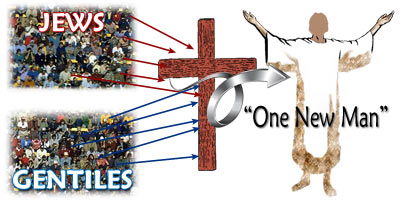Supersessionism, A Complex Theological Stance
Historical Background
Historically, Christianity has embraced the doctrine of supersessionism, often referred to as replacement theology.
This perspective implies or explicitly asserts that Christianity has replaced Judaism, effectively claiming that the Mosaic Covenant of the Hebrew Bible has been replaced by the New Covenant in Jesus Christ.
This New Covenant centers around salvation through God's grace, rather than strict obedience to the Torah.
A common thought to this belief is the idea that God's status of "chosen people" has transitioned from the Jewish community to the Christian Church.
Personal Reflections and Scriptural Insight
It is important to note that I DO NOT align with this belief. Even though Israel has rejected Jesus, it has not relinquished its status as God's chosen people. God, in His sovereign nature, does not waver or contradict Himself.
This conviction resonates with Jesus' statements as recorded in the Gospels and Paul's writings.
Matthew 5:17 (AMP) states:
"Do not think that I have come to do away with or undo the Law or the Prophets; I have come not to do away with or undo but to complete and fulfill them."
Additionally, Romans 11:29 (AMP) affirms:
"For God's gifts and His call are irrevocable. [He never withdraws them when once they are given, and He does not change His mind about those to whom He gives His grace or to whom He sends His call.]"
The Mosaic Covenant, Continuity and Transformation
The heart of supersessionism, wherein the Mosaic Covenant is purportedly annulled, finds varied agreement. Though adherence to God's Commandments may differ among believers, many of the laws of God are still observed, including observance of the Shabbat, some of the kashrut (dietary laws), and observance of other Holy days.
Jesus, The Fulfillment of the Law
Jesus Christ has inaugurated a way to approach God through grace, a path available to both Jew and Gentile. The Law, as referred to in traditional Judaism, does not offer a direct route to Heaven, especially considering the complexities and challenges of maintaining perfect obedience in our contemporary world. This leads to the profound words of Jesus, where He declared:
John 14:6 AMP
"Jesus said to him, I am the Way and the Truth and the Life; no one comes to the Father except by (through) Me."
Conclusion
Supersessionism, while historically influential within Christianity, is a complex and nuanced issue. Emphasizing a personal connection with the teachings of Jesus Christ, we can appreciate the ongoing significance of the Jewish tradition while recognizing that salvation is extended to all through Christ's grace.
This stance fosters a deeper understanding of the spiritual connection between Christianity and Judaism and a recognition of the timeless nature of God's promises and covenants.
It opens a dialogue between faith traditions and acknowledges the inherent value and continuity of God's revelation across time.







 Understanding our origins is crucial for comprehending our current direction and future path. This principle is central to the "Back to our Roots" movement. The early Christian church, as evidenced in the New Testament, was intrinsically linked to Judaism. However, historical events, such as the Councils of Elvira and Nicaea in the fourth century, marked a deliberate separation of the Church from its Jewish roots. These councils, among other things, sought to distance Christianity from its Jewish origins, even attempting to erase the connection between a Jewish Jesus and the Christian faith. As a result, many outward signs of this Jewish heritage, such as the tallit, the kippot (yarmulke), and the candles of remembrance and observance, gradually disappeared from Christian practice.
Understanding our origins is crucial for comprehending our current direction and future path. This principle is central to the "Back to our Roots" movement. The early Christian church, as evidenced in the New Testament, was intrinsically linked to Judaism. However, historical events, such as the Councils of Elvira and Nicaea in the fourth century, marked a deliberate separation of the Church from its Jewish roots. These councils, among other things, sought to distance Christianity from its Jewish origins, even attempting to erase the connection between a Jewish Jesus and the Christian faith. As a result, many outward signs of this Jewish heritage, such as the tallit, the kippot (yarmulke), and the candles of remembrance and observance, gradually disappeared from Christian practice. At the core of Messianic Christianity is the belief in Jesus as the Messiah, a belief that shapes its theological and eschatological perspectives. Messianic Jews, along with their Gentile counterparts in the movement, hold specific beliefs concerning pivotal events in Christian eschatology, such as the End of Days, the Second Coming of Jesus as the conquering Messiah, the re-gathering of Israel, the rebuilding of a Third Temple in Jerusalem, and the resurrection of the dead. These beliefs are deeply intertwined with traditional Jewish thought and prophecy, providing a unique lens through which both the Old and New Testaments are interpreted.
At the core of Messianic Christianity is the belief in Jesus as the Messiah, a belief that shapes its theological and eschatological perspectives. Messianic Jews, along with their Gentile counterparts in the movement, hold specific beliefs concerning pivotal events in Christian eschatology, such as the End of Days, the Second Coming of Jesus as the conquering Messiah, the re-gathering of Israel, the rebuilding of a Third Temple in Jerusalem, and the resurrection of the dead. These beliefs are deeply intertwined with traditional Jewish thought and prophecy, providing a unique lens through which both the Old and New Testaments are interpreted. The Messianic Jewish movement's approach to worship and scripture, which includes the use of Hebrew liturgy, the observance of Biblical feasts, and the celebration of the Sabbath on Saturday, can enrich the spiritual practices within EWCMI. These elements can provide a tangible connection to the early Christian church and its Jewish heritage, thereby enhancing the congregation's understanding and appreciation of the faith's historical foundations.
The Messianic Jewish movement's approach to worship and scripture, which includes the use of Hebrew liturgy, the observance of Biblical feasts, and the celebration of the Sabbath on Saturday, can enrich the spiritual practices within EWCMI. These elements can provide a tangible connection to the early Christian church and its Jewish heritage, thereby enhancing the congregation's understanding and appreciation of the faith's historical foundations.

















